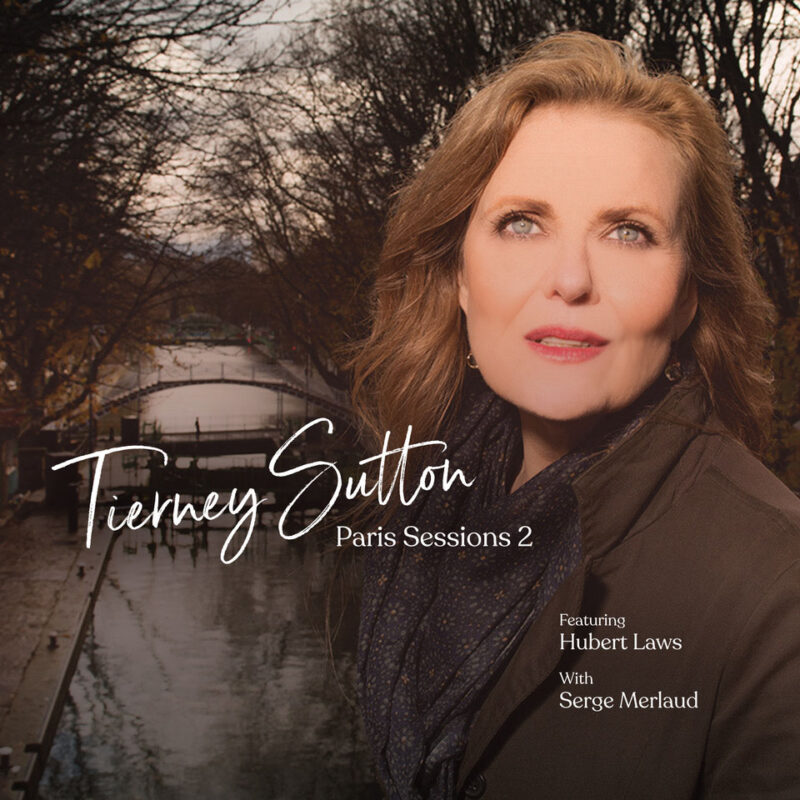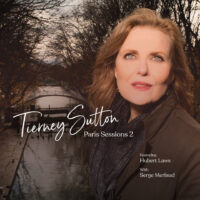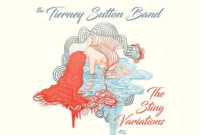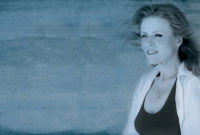Nine-time Grammy nominated jazz vocalist Tierney Sutton has been recording for twenty-five years. The Tierney Sutton Band (Christian Jacob/piano; Kevin Axt/bass; Ray Brinker – drums) performed for over 20 years. They played Jazz At Lincoln Center, Carnegie Hall and The Hollywood Bowl. Among Sutton’s releases are tributes to Bill Evans (Blue In Green), Joni Mitchell (After Blue), Frank Sinatra (Dancing In The Dark) and Sting (Sting Variations). One of her Grammy nominations was for the 2014 release Paris Sessions. This was a stylized bare bones approach to jazz that featured Axt, guitarist Serge Merlaud and Hubert Laws on flute. Tierney has released a follow-up, Paris Sessions 2. The album is dedicated to the iconic songwriting team of Alan and Marilyn Bergman, but the ensemble cover an interesting variety of composers. Sutton and Merlaud handle the arrangements.
Paris Sessions 2 opens with a breezy cover of Antonio Carlos Jobim’s “Triste” Backed by Merlaud’s lyrical acoustic guitar, Sutton utilizes vocalese and sings in Portuguese. Her voice is pristinely clear and she distills the melodic nuance of the composition. A certain highlight is the unique medley, “April In Paris/Free Man In Paris”. After Merlaud’s wistful guitar intro, Sutton infuses melancholy into the first song, and transitions seamlessly to Mitchell’s jazzy opus. Jazz vocalists endeavor to use their voices as an instrument of expression. This is a strength for this singer. She articulates a lilting resonance that captures the romanticism of these tunes. Laws joins on the Jobim reverie, “Zingaro”. Sutton blends with the feathery alto flute to create a gossamer texture that is compelling. The relaxed tempo is palpable, and her higher-register is effective. Both Laws and Merlaud have glowing solos.
“Isn’t It A Pity” was a rare unsuccessful Broadway number written by George and Ira Gershwin that subsequently established a jazz pedigree with covers by Sarah Vaughan, Ella Fitzgerald and Mel Torme. Sutton’s version is understated, but still emotive. As with all of the tracks, there is considerable feeling and atmosphere. Another popular-song transformation occurs on “Beautiful Love”. An interesting bossa nova arrangement is striking and the interaction of Merlaud and Axt is exemplary. Another graceful medley (“Cinema Paradiso”/“I Knew I Loved You”) combines the Bergmans and Ennio Morricone. Sutton explores the tenderness of both pieces, and Laws’ delicate touches are adroit. A second Bergman song, “Moonlight” (originally recorded by Sting for the film Sabrina) exudes a sensual vibe as Merlaud’s guitar accents are subtle. Another unique selection is “Pure Imagination” from the movie Willie Wonka & The Chocolate Factory (Leslie Bricusse/Anthony Newley). it is performed in a voice/guitar duet. Sutton’s airy wordless articulation is festive. The nuanced elocution of Laws (who gently slips in an Eric Satie reference) is palpable on the third Bergman piece (a collaboration with Dave Grusin), “A Child Is Born”.
Picking up the pace, another bossa nova translation, “Doralice” (which was on the seminal 1964 album, Getz/Gilberto) is a lively concise (2:36) performance that reinforces the accessibility of this genre. Switching gears, “August Winds” (from the Sting musical The Last Ship) details the reflective narrative of life in a shipyard town. Subtle vocal touches by Sutton add to the moody texture. Cole Porter’s timeless standard, “You’d Be So Nice To Come Home To” bristles with scatting, changing tempo and great soloing from Laws and Merlaud. On the finale, Sutton’s organic fusion with Laws turns “Chorado” into a hushed musical reverie.
Paris Sessions 2 is a great jazz album. Tierney’s supple voice is backed up by equally talented instrumentalists for an enjoyable, creative musical statement.







